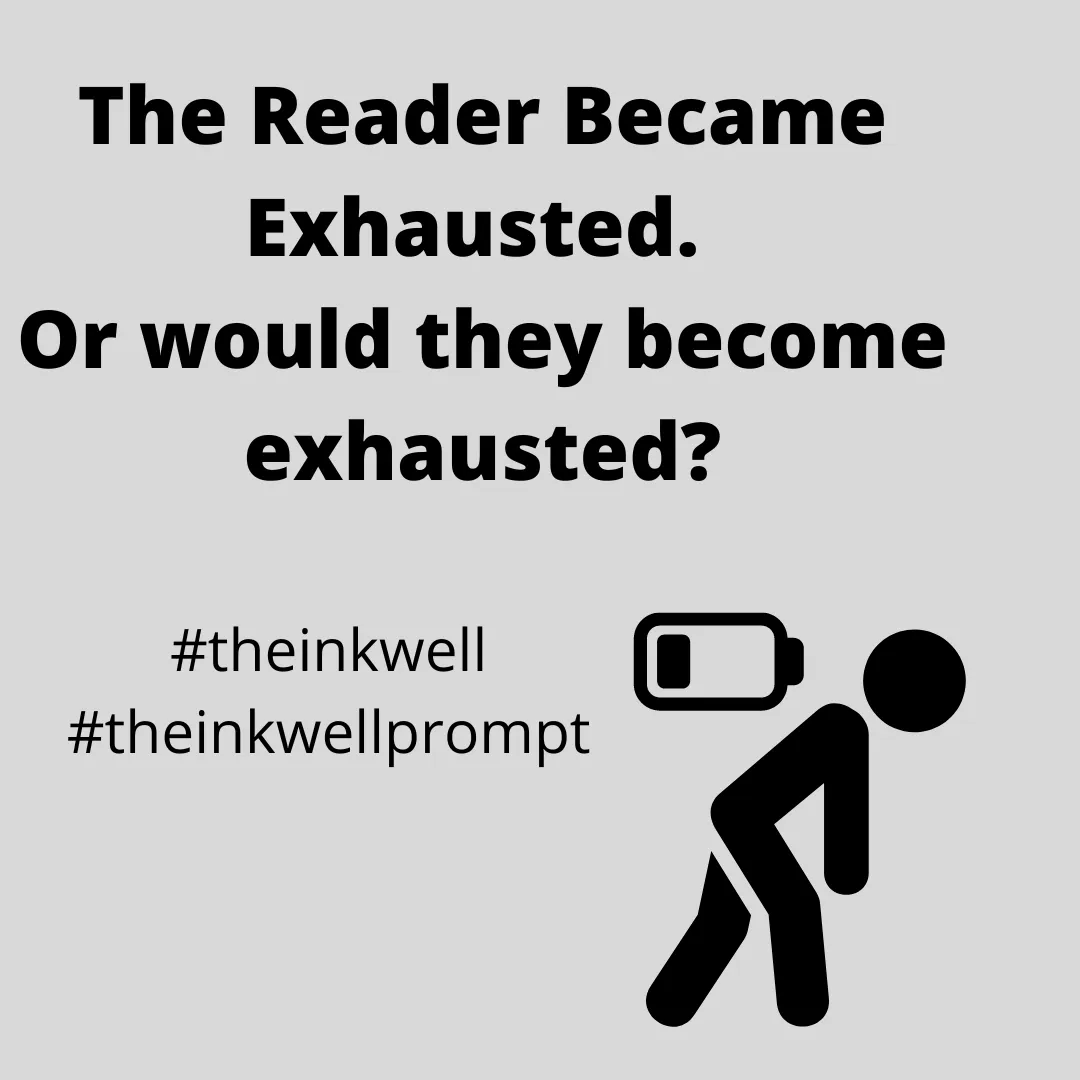
Cover created in CANVA using free elements.
The Reader Became Exhausted. Or would they become exhausted?
(Oh The Ink Well, with a prompt like 'Exhaust', could you have known the perils that may, or may not, be about to unfold).
The reader sat at their screen; they pondered on the use of the third person. Surely, they thought, the writer cannot mean me? Surely, they thought, the writer could not have known I’d be sat here at my screen debating the use of second or third person. Yet, the reader could not move on from this predicament as the writer would not allow such progression. Of course, the reader knows how clumsy and indeed awkward a ‘You’ can be in an opening sentence and therefore, the writer and the reader, must settle on ‘they’.
Doubt, however, is a fickle thing, and it may have begun to form in the wrinkles of their, that is, the reader’s, face. And indeed their face would continue to furrow as they work through the transition from ‘they’ to ‘their’, none the wiser or closer to moving into the experience of the story. The writer, seemingly avoiding gendered pronouns, but certain to imply a universality through them, might yet tempt them, the reader, who would still feel more comfortable being addressed in the second person, into the story.
But what of their concentration? Would they, as they sit at their screen, have the ability, whatever that might mean, to negotiate a series of prepositional or adjectival clauses, which the writer, quite deliberately, and with a love of adverbal clauses, might seek to use to draw them from their screen and into the world of the narrative. Or, they might wonder, are they already inside such a world? The reader may begin to wonder whether they, that is, they might think, the you, empathise with the writer’s reader.
Shall we try again? The reader, feeling disorientated now, would ordinarily agree passively, except they had reason to pause. They lingered on the question of the writer. Had the writer deliberately used the inclusive pronoun to hint that the use of the third person, in the opening sentence, was now being clarified as the reader, despite the awkward, ‘You’ not being used? Or was it, they thought, that it is to say, the reader, that they, let me clarify this as the writer, made an attempt to re-engage the reader into the story, without meaning to offer the reader was the subject of the opening sentence?
The reader inclined their head at thought, and once again began what it was that they had intended to do, before they had become distracted from the story by the writer, whose story was indeed not so much about the subject, whomever that may happen to be, but the object of the story itself.
And so, expectations unmet, the story again was beginning….
The reader sat at the screen. They were feeling contented to know that the piece that they intended to read was now moving beyond the opening. Yet, they couldn’t help feel the exhaustion of the moment taking them. The writer could quite rightly infer the reader to be slumped a little lower in their chair, and, taking a moment to readjust their posture, decided to pause the action to allow such an action to take place. Perhaps the moment would be filled with idle words, not meant to convey any such action or emotion, but allowing the reader time to refocus themselves on the task at hand. Their contentment, again restored, as the rhythm of the sentences regains a sense of rhythm. They know that it is rhythm which makes a story easy to read. Such rhythm, they might reflect, had been missing from the piece, and that lack of rhythm, they might blame, on having their slouching posture and creases on their face. Perhaps, it was, as the writer might suggest, quite deliberate, to offer such rhythm, not to allow the story to gain traction, but in fact, to allow a sentential adverb to disrupt the flow yet again, to draw the reader’s eyes to a stop.
The reader might yet wonder about leaving the story altogether, and now the idea has been not so gently germinated by the writer, it would linger in the mind of the reader. But, knowing the piece is coming to an end, would they not persevere? Would they not find the energy to see this one out?
But, they wondered, would the writer give them such a story that would allow their tensed muscles to relax? The writer might yet confound them, shifting the tense in such a manner as not only to exhaust, but to bring them back to the original question. Am I they?
The reader sat at the screen. The reader was to get up shortly. The reader would close their screen and the story, for indeed that is what they are told it is, will linger. They will wonder on its merits; for they will wonder if they read it accurately, yet, exhausted, how could they think to read it again?
